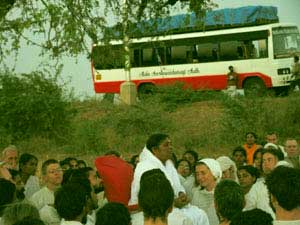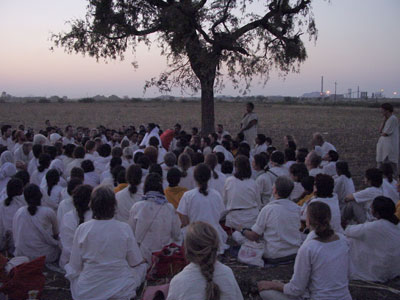21 February 2002, On the way to Hyderabad – North India Tour

The sun had all but completely set. Glowing like embers, it hung just above the horizon. Amma emerged from Her camper.
She looked to the West and waved excitedly at the departing sun – seemingly overjoyed at having caught the last opportunity to say goodbye to a friend.
Amma then walked to the field’s lone tree, where Her children were waiting, and took Her seat. “The sun has set,” She said in Malayalam. To which one brahmachari softly replied, “Yes, but our sun has risen.”
“OK, OK,” Amma said, “Some closed-eye meditation. Some open….” With that, Amma’s eyes closed and the group sat in silence. Those who kept their eyes open saw Amma’s hands casually forming a mudra as they rested in Her lap.

After a while, Amma called Swamiji to come sit by Her side and told him to pose questions for Her children to answer. He soon asked a question about the Kathopanishad, wherein a young boy named Nachiketha travels to the lord of Death and asks, what happens after one dies. The Upanishad depicts Death as a great Master.Swamiji wanted to know why.
Several answers were offered before Amma began speaking at length. Indeed, under that small tree, it seemed the perfect setting for such teachings – the traditional location for the imparting of knowledge. As the Kathopanishad is one of the most known Upanishads, many great Masters have composed commentaries on it. Still Amma’s teaching was from an entirely different perspective and wholly fitting for the Mother of Compassion.
As Swamiji translated Amma’s words into English, recounting the story of Nachiketha’s journey, Amma seemed to be listening as rapt as a child hearing a fairy tale. At the same time, it seemed as if his words were bringing forth distant memories, perhaps of Her witnessing this drama firsthand ages ago.
The basic story of the Upanishad is that Nachiketha’s father is performing a sacrifice that requires him to give away all of his possessions. However, he is only giving away useless things – like old, sick and dry cows. Observing this improper action, Nachiketha, an intelligent boy, understands that his father is incurring sin instead of merit by such false charity. He pesters his father with the question, “To whom shall you give me?” To which his father replies at last, in anger, “I give you to death!” Being a good and obedient son, Nachiketha soon starts on his journey.
However, upon his arrival at the home of death, he finds that the Lord of Death -Yama – is not there. Naciketa waits for three days and nights without food or sleep. When Yama finally returns, he makes amends by offering Nachiketha three boons. Nachiketha’s first asks for appeasement of the anger of his father, then for the secret of attaining heaven and finally the ultimate question: “What happens after death? Is there a soul surviving death, or is it total annihilation?” After testing the quality of the disciple, Yama finally imparts the great teaching to him.

Sitting under the tree, Her children huddled around Her; Amma said that it was the compassionate heart of Nachiketha that made him a fit recipient of the ultimate knowledge. Amma said that when he challenged his father, he was doing so out of compassion. Nachiketha did not want his father to receive the negative karmic repercussions of giving things of no value in charity. In fact, a dried-up cow is only a burden for a poor man who receives it, as he has to feed the cow also in addition to his family.
Thus, the sacrifice, instead of bringing the merit was only adding up the demerit of false show of charity to his father. The second boon that Nachiketha asks is also not for himself, but for the society,which again shows his compassion towards his fellow beings. Amma said, “When you totally forget yourself in your act of compassion, that is the death of your ego. Then you become a true disciple.”
Swamiji then went on to explain that the meaning behind Yama not being home when Nachiketha comes calling is that if one bravely goes looking for death, they’ll find that death is not there.
At this time, one of the devotees began to ask another question. Amma said that was enough for the day – “One relishes the food most when it is just enough to satiate the hunger.”
It was now night and a long journey still lay ahead.
